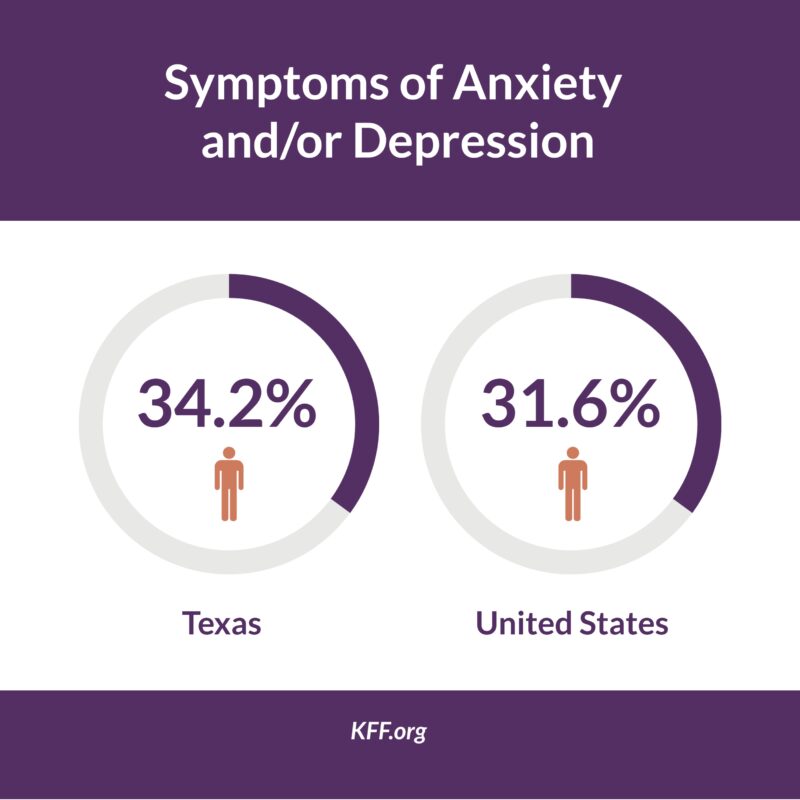By Wesley Gallagher
Like the rest of the country, Texas has seen a rise in mental health issues, as well as drug use and overdose in the past few years. Already an upward trend before 2020, the pandemic fanned the flame of a growing mental health crisis and an ever-worsening opioid crisis throughout the United States.
According to KFF.org, the number of adults in the US who reported symptoms of anxiety and depression rose from 1 in 10, to 3 in 10 between 2019 and 2020. In September of 2020, 15.1% of adults experienced new or increased substance use due to pandemic-related issues, and drug overdose deaths rose alongside this.
Texas by the Numbers

Statistics tell the same story in Texas: Mental illness and addiction are still on the rise. KFF.org also reports that, as of October 2021, 34.2% of adult Texans have symptoms of anxiety and/or depression, which is higher than the national percentage of 31.6%. It is also higher than pre-pandemic statistics showing that the percentage of adults with any mental health issue in Texas was only 17.2%. This was lower than the national percentage of 19.9%.
Additionally, deaths due to drug overdose rose in Texas from 9.5 per 100,000 in 2015, to 14.3 per 100,000 in 2020. This has been driven largely by opioid use, especially the synthetic opioid, fentanyl. Opioid deaths accounted for half of all overdoses in Texas in 2020.
Stats by City
Dallas
- Healthy North Texas reports a sharp rise in poor mental health among adults in Dallas County between 2017 and 2020.
- Deaths from drug poisoning have also been steadily rising since 2004.
Princeton
- According to the Collin County Sheriff’s Department, there has been a 571% increase in fentanyl-related drug overdose deaths in the last three years in the area.
Houston
- Deaths from fentanyl overdoses rose 340% between 2019 and 2021, says local news station ABC13.
- Houston State of Health shared that the percentage of adults who reported poor mental health 14 or more days in the last month steadily rose between 2014 and 2020.
Austin
- A public health emergency was declared in Austin in May 2022, amid a spike in drug overdose deaths in Travis County, according to the city of Austin’s website. The data issued by the county revealed that overdoses were the No. 1 cause of accidental death countywide.
- Fentanyl-related deaths were of particular concern, rising 237% from 2020.
- Issues impacting the rise in overdose deaths include lack of housing, homeless displacement, lack of harm reduction, training, wait-lists for methadone, and criminalization of substance use and poverty.
- In 2021, 32% of Travis County residents reported having five or more poor mental health days within the last 30 days, which is higher than the rest of Texas.
Research shared by the organization CertaPet lists Dallas, Houston, and Austin as three of the worst cities in America for mental health, based on ranking factors including accessibility and cost of mental healthcare, as well as quality of life. The 2021 Northeast Texas Health Status Report published by the University of Texas at Tyler indicated that the suicide rate in northeast Texas (where many of these cities are located) was 49% higher than in Texas overall in 2019.
Meadows Behavioral Healthcare in Texas
Statistics like these make it clear how important it is for quality mental healthcare to be available in East and North Texas. According to KFF.org, only a third of the mental healthcare needs of Texans are met, which means that the majority of Texas residents do not have access to necessary care.
Only a third of the mental healthcare needs of Texans are met, which means that the majority of Texas residents do not have access to necessary care.
Fortunately, Meadows Behavioral Healthcare continues to expand in the Lone Star State. In addition to our current inpatient center in Princeton (a short drive from Dallas), The Meadows Texas, and The Meadows Outpatient Center–Dallas, we are adding outpatient centers in Houston and Austin in spring 2023. Our virtual outpatient program, MBH Connect, is also currently available to all Texas residents. All of these facilities use our Meadows Model to treat mental health and addiction issues, providing personalized, whole-person treatment for lasting healing.
If you or someone you know is experiencing mental illness or addiction, please reach out today to learn how we can help.

